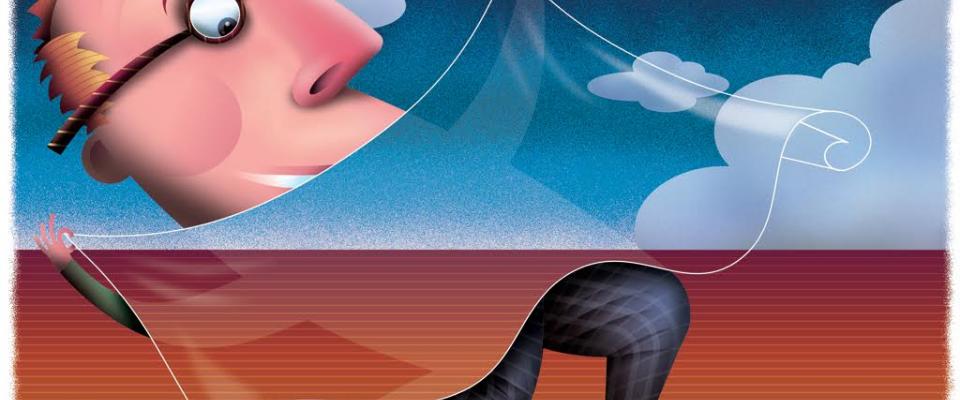It’s that time of year: many of you are frantically searching for gifts more creative than the candy canes-and-socks combo you usually fall back on. Take some tidings of comfort and joy in remembering that at UC Berkeley, researchers are constantly thinking up new, futuristic inventions with great potential to add to humanity’s store of knowledge and benefit society—not to mention offering the potential of becoming killer Christmas gifts. For your consideration:

A tracksuit that charges your smartphone
In the future, the clothes you wear could generate power when you work out, thanks to tiny strands of piezoelectric generators woven into the fabric. As Berkeley mechanical engineer Liwei Lin and his lab found in 2010, the electrospun fibers convert movement into electrical energy. More recently, in 2015, they developed a hollow fiber that’s both stronger than their original creation and produces more than twice as much power.
Perfect for: Your runner friend who’s impossible to reach because her phone is always dead.

Invisibility cloak
This past September, Berkeley Lab researchers basically made magic happen: They developed a tiny cloak that covers microscopic objects and makes them invisible. The super-thin material is made out of gold nanoantennas, which bend light back like a mirror and effectively render anything the material covers invisible. Happily, the researchers say it should theoretically be possible to make their cloaks large enough for objects we can actually see. Or, well, maybe not?
Perfect for: your dealer. You didn’t hear that from us, though!

Laundry-folding robot
Contrary to dystopian fiction tropes, robots are neither our masters nor our servants—yet. Berkeley computer scientist Pieter Abbeel is working steadily toward one of those futures, though: He taught a robot in his lab how to fold laundry of all different shapes and sizes that it hadn’t encountered before. (It’s harder than it sounds.) More recently, his robot has acquired the ability to place hangers on coat racks, tie knots, and screw the caps back onto water bottles. Soon, we humans will never have to move again.
Perfect for: really lazy college students

Mind-activated laptop
Berkeley researcher John Chuang figured out how to use a brainwave-reading headset as a way to essentially think your way into your computer with “passthoughts” instead of passwords. The set reads the electric signals from your brain as you think a certain thought, and can successfully identify you based on those unique brainwaves, which means no more racking your brain to remember which variation of your childhood pet’s name you used this time around. The mind-reading set Chuang and his team used is already available for purchase, but getting it to actually unlock your laptop is still a ways off.
Perfect for: Your forgetful friend who keeps misplacing his personal possessions—and anyone over 50.

Futuristic lumps of coal
Your kids have been naughty this year, but coal is so 19th century. Luckily, it’s not the only form of carbon around these days—may we suggest sheets of graphene to stuff into their stockings? They’re a favorite of Berkeley nanoengineers, who use the new material as a semiconductor to create things like ultrasonic radios and microphones. It’s also microscopic and so thin (two-dimensional, in fact) that your children won’t even be able to tell you gave them anything at all!
Perfect for: your badly-behaved aspiring chemical engineer

Glasses for the colorblind
Enchroma, a Berkeley-based company co-founded by Cal alums Andrew Schmeder and Tony Dykes, offers color-corrective glasses for those who have common forms of color blindness.. To accomplish this, the lenses adjust spectrums of light to make colors more pure, forcing colors into primary categories rather than allowing them to shift into intermediate shades, Schmeder told California. Enchroma offers three different lens types: the Cx-14, a dark sunglass lens that provides best color enhancement in bright daylight; the Cx-25, a medium sunglass lens that works well in most outdoor conditions and in well-lit indoor environments; and the Cx-65, a light lens that works best indoors when looking at display screens. The glasses also come in different styles like Hawk, Gamma, Receptor, and more. A pricey gift choice at around $400, they nonetheless could be worth it to give a loved one the chance to experience color the way the rest of the world does.
Perfect for: The person with 20/20 vision who wants to walk around in a Technicolor world. And duh, the colorblind.

Fat implants
The general idea around losing weight is to consume less fat—but the caveat is that there is not only one kind of fat. The fat that makes us overweight is “white fat,” which stores energy, while “brown fat,” which burns glucose and fatty acids resulting in energy released as heat, has the opposite effect. The more brown fat there is in your body, the higher your metabolic rate, and the more calories you burn. Unfortunately, people lose most of their brown fat as they age, so adults are mostly comprised of white fat. Berkeley researchers Kevin Tharp and Amit Jha are working on a medical procedure to make white fat function like the energy-burning brown fat, via an implant. They’ve reported that it works in mice, although it has yet to be perfected for humans. But it holds the promise of someday providing an easier and healthier treatment for obesity than, say, stomach stapling.
Perfect for: On second thought, maybe not an ideal gift for anyone with whom you want to stay on good terms.

Smart Vibrator
UC Berkeley entrepreneurs Liz Klinger and James Wang are co-creators of Lioness (originally called Smartbod), a silicone vibrator designed like a wearable fitness device that works to track female pleasure using internal sensors. The device allows women to find their “baseline” of pleasure, then tracks data to make suggestions about what other things would feel good to their bodies. For whatever reason, statistics show that women masturbate far less than men do. When a device like Lioness finally hits the market, it could make masturbation and the search for an orgasm more appealing to women—and perhaps increase those numbers in female favor.
Perfect for: Your poor BFF who has read such titles as The Elusive Orgasm: A Woman’s Guide to Why She Can’t and How She Can Orgasm, with no luck.

Eyeglass-Free Displays
According to Pew Research, 64 percent of Americans own a smart phone—and with 20.6 million American adults age 18 and over reporting vision loss, it’s probably not ideal that they be squinting at screens all day. So Berkeley researchers Brian A. Barsky and Fu-Chung Huang and their colleagues at MIT worked to develop an eyeglass-free display prototype that pre-distorts content to adjust for impaired vision, eliminating the need for contacts, glasses, or intense squinting. By adjusting the display for each user’s unique eyesight, this technology has the potential to reduce eyestrain for the many who already are experiencing vision loss.
Perfect for: Your grandma who refuses to put on her spectacles and keeps asking you to help her read the directions for Solitaire (of all things). Also good for the already-bifocaled teenager who cannot tear herself away from Candy Crush.




















